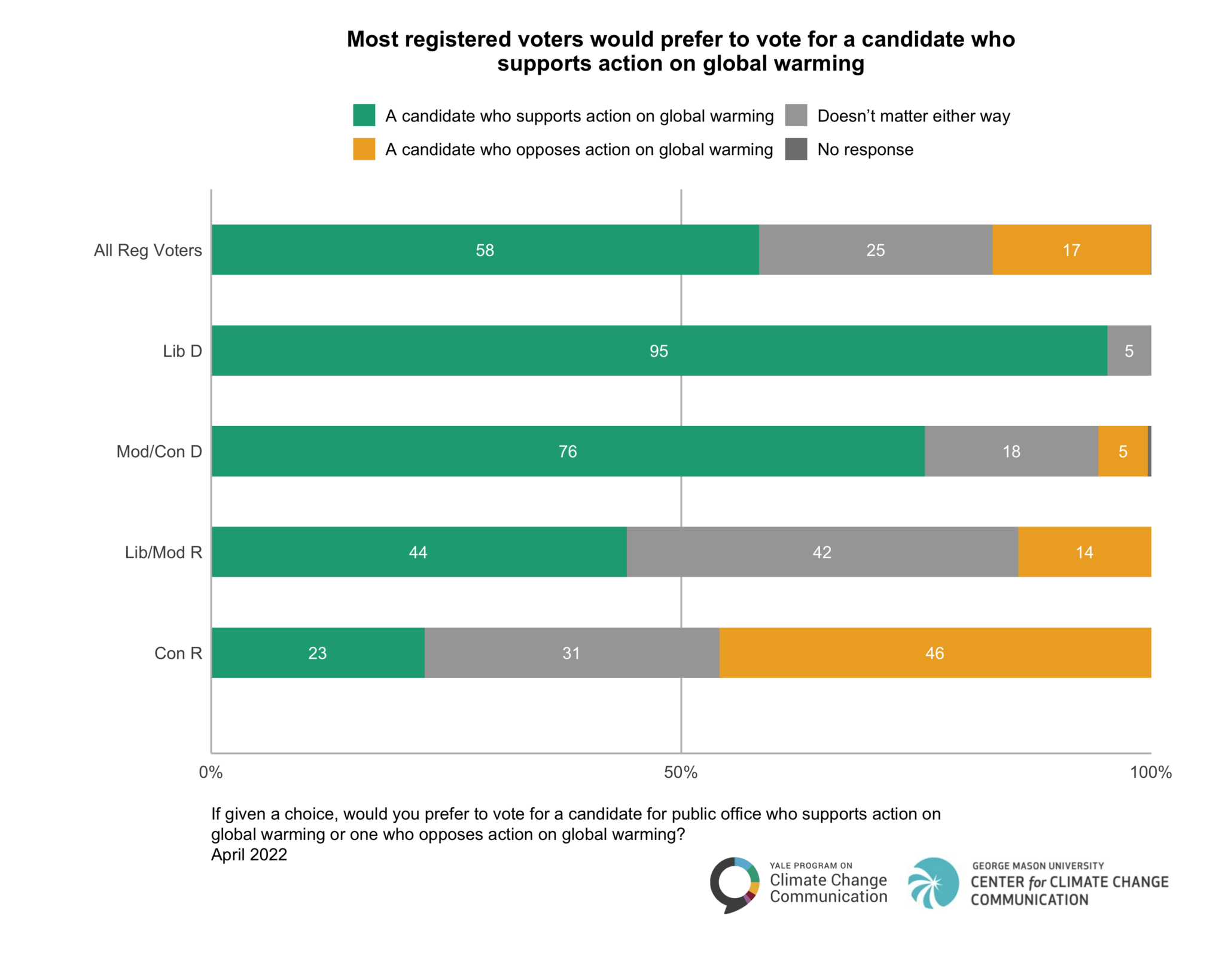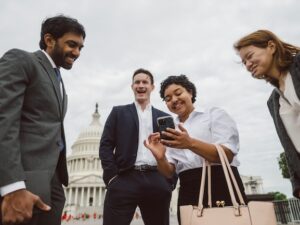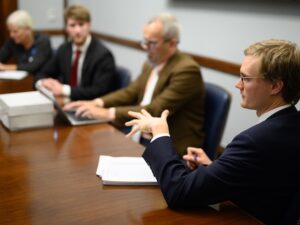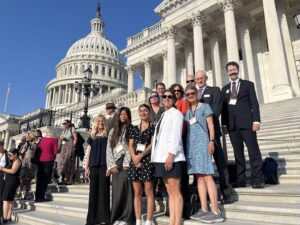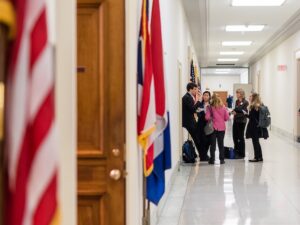Yale polling shows emergence of climate change as a voting issue
By Steve Valk
As the midterm election season heats up, Citizens’ Climate Lobby has advised our volunteers that this is a prime time to elevate the issue of climate change in Congress, as incumbents and challengers seek votes to keep or attain seats in the House and Senate.
Polling earlier this year from the Yale Program on Climate Change Communication indicates we may see the emergence of climate change as a voting issue. About four in ten registered voters (39%) say a candidate’s position on climate change will be “very important” when deciding who they will vote for.
One caveat: Yale’s poll was taken in April and May this year, before passage of the Inflation Reduction Act, the biggest bill to address climate change the U.S. has ever enacted. Later, I’ll have more thoughts on how this success may affect enthusiasm among climate-minded voters to turn out in November.
If candidates look solely at polls to determine their legislative priorities, however, climate may not rise to the top of the list. The Yale poll asked registered voters about 29 issues, and global warming was 24th in the percentage of respondents who ranked the issue “very important.” This is why CCL suggests that volunteers engage in election activities — asking questions at town hall meetings and campaign events, tabling in their communities, publishing letters and op-eds in newspapers about climate change and the election, interacting with members of Congress and candidates on social media. Candidates simply need to hear from people that to earn their vote, office seekers must commit to acting on climate.
The good news from the Yale poll is that a majority — 58% — of registered voters would prefer to vote for a candidate who supports action on climate change, compared with only 17% who would prefer someone who opposes such action. There is, however, a wide ideological gap in that support. Among liberal Democrats, climate change as a voting issue ranks extremely high, with 95% saying they would prefer a candidate supporting climate action. That number drops to 23% among conservative Republicans. How high a candidate prioritizes climate change may well depend on which segment of the electorate the candidate is trying to motivate.
Concerning policies that reduce the pollution that causes global warming, the Yale poll found high levels of support for…
- tax incentives or rebates to homeowners, landlords, and businesses to make existing buildings more energy efficient (87%)
- tax rebates to people who purchase energy-efficient vehicles or solar panels (77%)
- regulating carbon dioxide as a pollutant (74%)
- transitioning the U.S. economy from fossil fuels to 100% clean energy by 2050 (69%)
- requiring fossil fuel companies to pay a tax on the carbon pollution they produce, and using that revenue to reduce other taxes (such as the federal income tax) by an equal amount (66%)
- requiring electric utilities to produce 100% of their electricity from renewable energy sources by 2035 (63%)
With such strong support for climate mitigation policies, we might expect that enacting those policies into legislation would be a slam dunk. Unfortunately, there’s a huge perception gap about support for those policies. A survey from Climate Communications released last week found that people vastly underestimate public support for these measures. Scientific American reports on the study:
Recent polls from the Yale Program on Climate Change Communication show that 66 to 80 percent of people in the U.S. support major climate mitigation policies. But participants in the new study estimated that only between 37 and 43 percent do so. A range of 80 to 90 percent of those polled by the researchers underestimated the U.S. population’s climate concern and support for major climate mitigation policies.
Why is this important? Scientific American’s Robin Lloyd interviewed Gregg Sparkman, lead author of the study, who talked about the cascading effects of this “false social reality”:
“When people assume something isn’t popular, they don’t talk about it. Or if you think people aren’t worried about something, you don’t talk about it. So everyone self-silences. And collectively, the outcome of that is pretty big. Because whenever we look around, and we see nobody talking, it just confirms that it seems like nobody cares. And you get what’s called a spiral of silence.”
So, as climate scientist Katharine Hayhoe often says, the most important thing we can do to fight climate change is to talk about climate change. And the most important people we can talk to about climate change are the ones who write our laws and set our national agenda in Washington. Those people are most accessible during campaign season, and CCL has a great training on how to engage members of Congress and candidates at town hall meetings and candidate forums.
As I mentioned, the Yale polling took place several months before the passage of the Inflation Reduction Act. How might this affect turnout of climate-concerned voters or the priority voters place on the climate issue? Would they look at enactment of major climate legislation and, thinking the problem is solved, disengage? “Mission accomplished! Guess I don’t have to vote!”
I actually believe the recent success in Congress will spur more engagement. For so many years, lawmakers tried and failed to enact policies to fight climate change. And with each failure, a malaise gradually set in among people worried about global warming, a resignation that Congress was incapable of solving the problem. That resignation manifested itself in people shutting down and not showing up at the polls. Many asked, what was the point?
The miraculous, last-minute victory of this legislation helps restore people’s faith in our government’s ability to respond to and address big problems like climate change and leaves them hungry for more. People are ready, I think, to get off the sidelines and get back in the game. As we say at CCL, the solution to climate change is democracy, and voting is the first step toward engaging in our democracy. To paraphrase “Field of Dreams,” if you pass it, they will come.
A tidbit from @Enviro_Voter battleground state polling taken just *before* the #InflationReductionAct. Climate-first voters were surprisingly unmotivated to vote, but elsewhere the poll showed that was tied to congressional inaction on climate.
I bet that 33% has now been halved pic.twitter.com/CRomQ9Su5Q
— Nathaniel Stinnett (@NCStinn) August 25, 2022
Nathaniel Stinnett, Executive Director of Environmental Voter Project, has a similar take on the Inflation Reduction Act’s impact on voter enthusiasm among those concerned about climate change. Tweeting about polling EVP conducted before the IRA was passed, he notes, “Climate-first voters were surprisingly unmotivated to vote, but elsewhere the poll showed that was tied to congressional inaction on climate… I bet that 33% [of those who said they were less motivated] has now been halved.”
Speaking of EVP, Stinnett’s organization is again working to get environmental voters to the polls in November, a strategy aimed at demonstrating to elected officials how important climate change is to voters. CCL is supporting that effort, and you can learn more about how to volunteer with EVP in this post.
Yale’s polling shows that climate change as a voting issue could be a factor in the upcoming election, but perceptions are just as important as actual data. Therefore, engagement with candidates — letting them know they need to take action on the issue — will play a critical role in determining whether Congress prioritizes climate change going forward.

